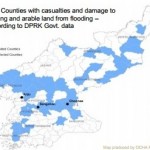Institute for Far Eastern studies (IFES)
2013-1-31
The total amount of assistance provided to North Korea by the South Korean government and private organizations in 2012 decreased by 28 percent against 2011, which marks six years of continuous decline.
The Ministry of Unification revealed on January 27 that the total amount of South Korean assistance to North Korea tallied 14.1 billion KRW (13 million USD), with 2.3 billion KRW (2.12 million USD) of government aid for vaccines and medical trainings and 11.8 billion KRW (10.89 million USD) from the private sector for medical supplies. This is a 28.1 percent drop from the previous year’s total of 1.96 billion KRW (18.09 million USD).
The South Korean government sent about 6.5 billion KRW (6 million USD) of medical supplies to North Korea via UNICEF and the private sector sent about 13.1 billion KRW (12.1 million USD) of malaria prevention supplies, powdered milk, soy milk, and flour.
Last year was the lowest record for humanitarian assistance to North Korea in sixteen years. Prior to this low was 1996, which recorded 3.6 billion KRW (3.3 million USD).
Lee Myung-bak administration’s aid to North Korea for the last five years reached a total of 257.5 billion KRW (236.2 million USD), with 102.4 billion KRW (93.94 million USD) in government funds and 155.1 billion KRW (142.3 million USD) from the private sector. This is equal to only 20 percent of the Roh Moo-hyun administration’s 1.275 trillion KRW (1.17 billion USD), and 44 percent of the Kim Dae-jung administration’s 582.9 billion KRW (534.8 million USD) of total aid to North Korea.
The highest record for South Korean humanitarian aid to North Korea was in 2006 at 298 billion KRW (273.4 million USD), in both government and private sector aid and continued to remain at a high level in 2007 with 289 billion KRW (265.1 million USD) in 2007. However, with the launch of the Lee Myung-bak government in 2008, it dropped to 116 billion KRW (106 million USD), and continued the downward slide recording 67.1 billion KRW (61.6 million USD) in 2009; 40.4 billion KRW (37.06 million USD) in 2010; 19.1 billion KRW in 2011 (17.5 million USD); and 14.1 billion KRW (12.9 million USD) in 2012.
The source of the drop in humanitarian assistance can be attributed to deadlocked inter-Korean relations followed by the shooting death of a Mount Kumgang tourist in 2008; long-range rocket launch and second nuclear test in 2009; and Cheonan and Yeonpyeong Island incidents in 2010.
From 1995 to 2012, the total amount of humanitarian aid to North Korea from the South Korean government was 1.48 trillion KRW (1.36 billion USD) and from the private sector was 871 billion KRW (799.1 million USD), equating to about 2.347 trillion KRW (2.15 billion USD) in total.
Meanwhile, international humanitarian aid to North Korea increased 30 percent in 2012 against the previous year. According to the United Nation’s Office for the Coordination of Humanitarian Affairs (OCHA), total aid to North Korea in 2012 was 113 million USD while the previous year reached 89.2 million USD. It quadrupled to the total amount, 24.4 million USD of 2010.
Nineteen countries joined in the effort to provide humanitarian aid to North Korea such as South Korea, Norway, Switzerland, Canada, Russia, Brazil, and Sweden. In 2010, there were only six countries, and it later increased to seventeen countries in 2011. The OCHA announced that the humanitarian aid provided in 2012 focused mainly on improving the food supply and nutrition, and provided agricultural support.
UPDATE: Here is a similar report in Yonhap (2013-1-27):
South Korea’s humanitarian aid to North Korea dropped 28 percent to a record 16-year low last year, the unification ministry said Sunday, as the cross-border relations remained chilled under Seoul’s outgoing government of President Lee Myung-bak.
Seoul’s humanitarian aid to the impoverished North totaled 14.1 billion won (US$13.1 million), compared with 19.6 billion won a year earlier. Last year’s amount is the lowest since 1996 when only 3.6 billion won was provided to the North in humanitarian aid.
The sharp drop came as relations between the two Koreas remained frozen since the North sank a South Korean warship near their Yellow Sea border in March 2010 and then shelled a border island in November that year. Pyongyang’s nuclear test and rocket launches also affected their ties.
The total amount of assistance the South provided the North during the five years of President Lee was 257.5 billion won, including 155.1 billion won of civilian aid. The total amount is only 20 percent of the aid sent during the presidency of Lee’s predecessor, the former late President Roh Moo-hyun.

